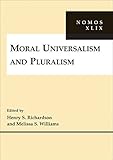Moral Universalism and Pluralism : NOMOS XLIX / Melissa S. Williams; ed. by Henry S. Richardson.
Material type: TextSeries: NOMOS - American Society for Political and Legal Philosophy ; 9Publisher: New York, NY : New York University Press, [2008]Copyright date: ©2008Description: 1 online resourceContent type:
TextSeries: NOMOS - American Society for Political and Legal Philosophy ; 9Publisher: New York, NY : New York University Press, [2008]Copyright date: ©2008Description: 1 online resourceContent type: - 9780814794487
- 9780814769119
- 341.01 22
- online - DeGruyter
| Item type | Current library | Call number | URL | Status | Notes | Barcode | |
|---|---|---|---|---|---|---|---|
 eBook
eBook
|
Biblioteca "Angelicum" Pont. Univ. S.Tommaso d'Aquino Nuvola online | online - DeGruyter (Browse shelf(Opens below)) | Online access | Not for loan (Accesso limitato) | Accesso per gli utenti autorizzati / Access for authorized users | (dgr)9780814769119 |
Browsing Biblioteca "Angelicum" Pont. Univ. S.Tommaso d'Aquino shelves, Shelving location: Nuvola online Close shelf browser (Hides shelf browser)

|

|

|

|

|

|

|
||
| online - DeGruyter Hare Krishna Transformed / | online - DeGruyter Immigration and American Popular Culture : An Introduction / | online - DeGruyter Law and Justice as Seen on TV / | online - DeGruyter Moral Universalism and Pluralism : NOMOS XLIX / | online - DeGruyter Extraordinary Justice : Military Tribunals in Historical and International Context / | online - DeGruyter At Home in Nineteenth-Century America : A Documentary History / | online - DeGruyter Black Gay Man : Essays / |
restricted access online access with authorization star
http://purl.org/coar/access_right/c_16ec
Moral universalism, or the idea that some system of ethics applies to all people regardless of race, color, nationality, religion, or culture, must have a plurality over which to range - a plurality of diverse persons, nations, jurisdictions, or localities over which morality asserts a universal authority. The contributors to Moral Universalism and Pluralism, the latest volume in the NOMOS series, investigate the idea that, far from denying the existence of such pluralities, moral universalism presupposes it. At the same time, the search for universally valid principles of morality is deeply challenged by diversity. The fact of pluralism presses us to explore how universalist principles interact with ethical, political, and social particularisms. These important essays refuse the answer that particularisms should simply be made to conform to universal principles, as if morality were a mold into which the diverse matter of human society and culture could be pressed. Rather, the authors bring philosophical, legal and political perspectives to bear on the core questions: Which forms of pluralism are conceptually compatible with moral universalism, and which ones can be accommodated in a politically stable way? Can pluralism generate innovations in understandings of moral duty? How is convergence on the validity of legal and moral authority possible in circumstances of pluralism? As the contributors to the book demonstrate in a wide variety of ways, these normative, conceptual, and political questions deeply intertwine.Contributors: Kenneth Baynes, William A. Galston, Barbara Herman, F. M. Kamm, Benedict Kingsbury, Frank I. Michelman, William E. Scheuerman, Gopal Sreenivasan, Daniel Weinstock, and Robin West.
Mode of access: Internet via World Wide Web.
In English.
Description based on online resource; title from PDF title page (publisher's Web site, viewed 01. Nov 2023)


